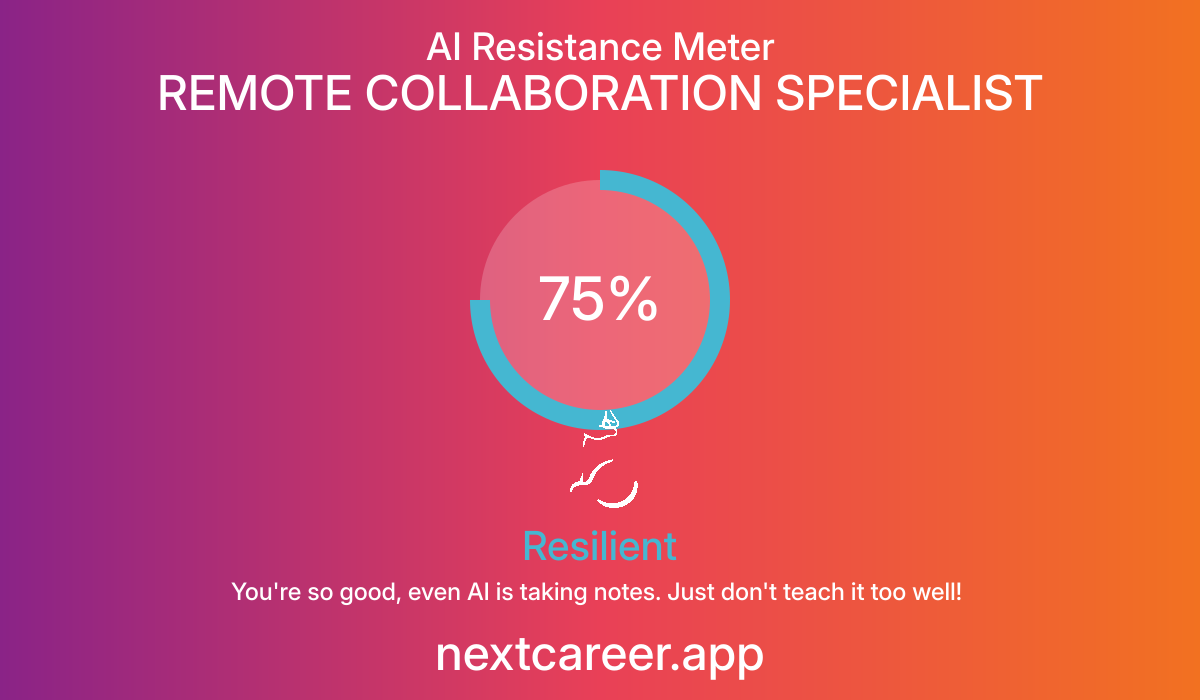AI Resistance for REMOTE COLLABORATION SPECIALIST
AI Resistance Score
AI Resistance Meter
Resilient
REMOTE COLLABORATION SPECIALIST
You're so good, even AI is taking notes. Just don't teach it too well!
A Remote Collaboration Specialist's role is moderately resistant to AI due to its reliance on human-centric skills such as emotional intelligence, nuanced communication, and the ability to foster team dynamics across different geographies and cultures. While AI can assist with the technical facilitation of collaboration through tools and platforms, the human elements of empathy and complex problem-solving in group settings are less susceptible to automation. The adaptability of this role also supports its resistance, as workers can learn to leverage AI to enhance collaboration rather than be replaced by it.
A Remote Collaboration Specialist's role is moderately resistant to AI due to its reliance on human-centric skills such as emotional intelligence, nuanced communication, and the ability to foster team dynamics across different geographies and cultures. While AI can assist with the technical facilitation of collaboration through tools and platforms, the human elements of empathy and complex problem-solving in group settings are less susceptible to automation. The adaptability of this role also supports its resistance, as workers can learn to leverage AI to enhance collaboration rather than be replaced by it.
Key Factors
- Cognitive Tasks: AI can handle some cognitive tasks such as data analysis and scheduling but lacks the ability to manage complex interpersonal dynamics inherent in remote collaboration.
- Emotional Intelligence: High need for interpreting emotions and managing social relationships, which remains challenging for AI to fully automate.
- Physical Skills: The role is not reliant on physical skills, but rather on facilitating communication, which is aided by but not replaced by technology.
- Creative Thinking: Requires creativity in forming inclusive, effective remote work practices and problem-solving during collaborations.
Human Advantages
- Empathy and emotional intelligence in facilitating trust and team dynamics.
- Cultural sensitivity and nuanced communication.
- Adapting and creating new collaboration methods as technology evolves.
AI Vulnerabilities
- Automated scheduling and management tools.
- AI-driven data analysis and reporting.
Recommended Actions
- Develop skills in digital collaboration tools to enhance efficiency.
- Focus on interdisciplinary learning to manage complex team dynamics across various sectors.
- Emphasize continuous learning in emotional intelligence and cultural competence.
- Explore the integration of emerging tech like VR to improve remote collaboration experiences.
- Advocate for and implement AI tools that enhance but do not replace human-centered aspects of collaboration.
In the near term (5 years), AI will increasingly assist in managing and enhancing the efficiency of remote collaboration through improved tools that automate routine tasks. However, the need for human oversight and the unique capacity for nuanced communication and empathy will preserve the job's core functions. In the long term (20+ years), while AI may achieve more advanced capabilities in understanding and mimicking human interactions, this role will likely evolve to further emphasize strategic coordination and creative problem-solving, adapting to more sophisticated collaboration paradigms possibly involving virtual reality or advanced human-AI interfaces.
